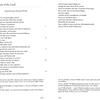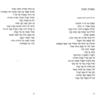1: Poem, Dahlia Ravikovitch's, "The Fruit of the Land," circa 2005.
Dahlia Ravikovitch died in 2005, and this was one of the last poems she wrote. It was published posthumously. By taking on the voice of the Israeli military, and weaving in biblical and national references, Ravikovitch points to what she sees as the irony and the futility of her country's military culture.
Suggested Activity: Read the poem aloud with students, and have them read it again silently, underlining phrases or lines that pop out at them. Ask them to share what they underlined, and think about why those pieces stood out? Then discuss: Who is speaking in this poem? Who is the "You" and the "They" and the "We"?
Ask students to make a list of all of the weapons or military objects mentioned in the poem. Have them add to the list any words that reference fighting, violence, or war. How much of the poem is taken up with such words? How does it feel to read all those words together? What is the poem's stance toward all this militarization?
Finally, ask students to consider the poem's epigraph: "a farewell song to the good old days". In what ways is this a "farewell"? And when were "the good old days"?
Sources: "The Fruit of the Land", from HOVERING AT A LOW ALTITUDE: THE COLLECTED POETRY OF DAHLIA RAVIKOVITCH by Dahlia Ravikovitch, translated by Chana Bloch and Chana Kronfeld. Copyright © 2009 by Chana Bloch, Chana Kronfeld, and Ido Kalir. English translation copyright (c) 2009 by Chana Bloch and Chana Kronfeld. Used by permission of W. W. Norton & Company, Inc. This selection may not be reproduced, stored in a retrieval system, or transmitted in any form or by any means without the prior written permission of the publisher.
Dahlia Ravikovitch, "Mizimrat ha'aretz," in Kol ha-shirim, Dahlia Ravikovitch (Bney Brak, Israel: Hakibbutz Hameuchad, 2010). Used by permission of Ido Kalir.
Fruit_of_the_Land_English.jpg
 Download image (193.5 KB)
Download image (193.5 KB) Fruit_of_the_Land_Hebrew.jpg
 Download image (122.22 KB)
Download image (122.22 KB)


